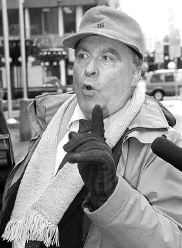| http://www.nationalpost.com/search/story.html?f=/stories/20000722/351386.html  The
Holocaust for dummies The
Holocaust for dummies
Jonathan KayHolocaust
deniers distort history yet often get
the best of staged
confrontations DENYING
HISTORY: WHO SAYS THE HOLOCAUST NEVER
HAPPENED AND WHY DO THEY SAY IT?
By Michael
Shermer and Alex Grobman: University of
California Press, 312 pp.,
$42.50 Canadian
Holocaust denier Ernst
Zündel admires the Third
Reich  YOU
will not find a more straightforward
Holocaust book than
Denying
History: Who Says the Holocaust Never
Happened and Why Do They Say
It. The
authors' basic argument is this: The
extermination of six million Jews during
the Second World War is a historical fact.
Those who deny it are wrong. YOU
will not find a more straightforward
Holocaust book than
Denying
History: Who Says the Holocaust Never
Happened and Why Do They Say
It. The
authors' basic argument is this: The
extermination of six million Jews during
the Second World War is a historical fact.
Those who deny it are wrong.
It's hardly a provocative thesis. But
ask yourself this: Would you be able to
refute a Holocaust denier? The fact of the
Holocaust is like the spherical Earth:
Every reasonable person accepts it, but
few can prove it. That is why Skeptic
magazine publisher Michael Shermer
teamed up with historian Alex
Grobman to write
Denying
History. They believe thinking
people have a duty to fight Holocaust
denial head on; and they want them to come
to the battle armed with historical
facts. When the eyes of the public are upon
them -- such as during the 1985 trial of
Canadian Holocaust denier Ernst
Zündel, or the famous 1994
Donahue episode that pitted two Holocaust
deniers against Shermer and an Auschwitz
survivor -- deniers often get the best of
staged confrontations. The most prominent
deniers know a lot about the Holocaust,
especially arcane subjects like the
chemistry of Zyklon-B gas and the
architecture of gas chambers. Many of the
sound bites they spit out are quite true.
It is a fact, for instance, that the Nazis
never manufactured soap
from Jewish bodies on a mass scale --
contrary to urban legend. Deniers are also
correct when they claim that there is no
known Holocaust order bearing Hitler's
signature. David Irving, the
on-again off-again denier who recently
lost a defamation
suit in Britain, has never had to make
good on his $1,000
challenge to any historian who could
produce such a document. But, as Denying
History makes clear, there is still
a mountain of evidence proving the nature
and scale of the Holocaust. The Nazis' use
of gas chambers has been established by,
among countless other sources, the 1946
Nuremberg confession of Auschwitz
commandant Rudolf Höss, as
well as the 250-page autobiographical
manuscript he wrote while awaiting
execution. The estimate of six million
killed is supported by a spate of
historical studies, and also by Nazi
physician Wilhelm Höttl,
who testified at Nuremberg that: "In the
various concentration camps approximately
four million Jews had been killed, while
about two million were killed in other
ways." None of this evidence convinces the
true denier, of course. He is, by
necessity, a conspiracy theorist. To him,
every confession was coerced, every
photograph
faked. As the authors of
Denying
History demonstrate in
psychological profiles of today's most
prominent deniers, they see the "holohoax"
as a plot by Jews (or, "the traditional
enemies of truth" as they are commonly
referred to in denier circles) to
discredit the Nazi regime and the German
people. "There are certain aspects of the
Third Reich that are very admirable
[such as its eugenics and euthanasia
programs] and I want to call people's
attention to these," Zündel told
Shermer and Grobman in an interview. What
the Holocaust has done, he argues, is to
"bar so many thinkers from re-looking at
the options that National Socialism
German-style offers." It is tempting to mock these confused
men (there is a great essay to be written
on why there does not exist a single
preeminent female denier). But
Denying
History betrays no contempt for its
subjects. The authors believe everyone has
a right to be heard; and they treat
Holocaust deniers with clinical
detachment. This attitude reflects the
authors' position of intellectual
strength. Hatred for Holocaust deniers is
compounded by the helpless fear that the
pseudo-historians' specious lies may
spread. When one is armed with concrete
knowledge, however, that fear is lessened
and hatred gives way to pity.
|